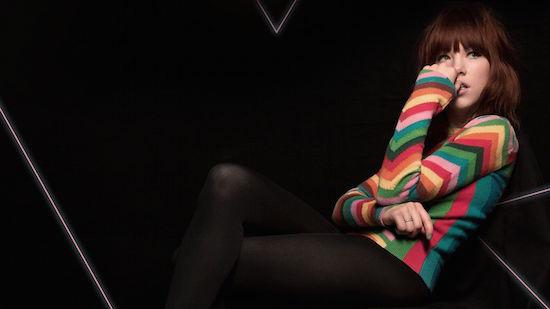This is no place for bubblegum pop. Squeezed away off the side of Union Square, on the northern tip of the East Village, Irving Plaza is the type of clammy old theatre that only has a chandelier in its main auditorium to accentuate how modest and half-busted the rest of the place is. Somehow they manage to cram a thousand people in here at capacity, but it really shouldn’t fit more than 800. It smells like last night’s sweat.
But then, Carly Rae Jepsen isn’t just bubblegum pop. What she is exactly is hard to say right now, but there’s more to her music and image than most people took the time to consider six months ago. All of a sudden she’s this year’s critical darling, some sort of saviour for transcendent, melodic pop. Her new record, E•MO•TION, has been pored over and dissected by critics, adored by people that would have baulked at her music before the summer started.
It would be easy to suggest that there’s some groupthink behind this newfound indie-circle fawning, but E•MO•TION really is that good a record: joyful, aching, shimmering, instantly gratifying but demanding of repeated listens. It places Jepsen in newfound territory – the synth-driven 80s thread apparently inspired by a Cyndi Lauper show that Jepsen caught in Tokyo – and it sounds that much more immaculate for it.
But who turns up to a Carly Rae Jepsen show? I hadn’t really given it much thought before today. Surely her core fanbase still consists of adolescent girls and their parents whether it’s a school night or not. I am struck by the notion that I’ll be the only twenty-something man-child in the room.
In fact, tonight’s crowd is more akin to that of an art gallery opening. It’s predominantly male, for starters, and many of the men carry what I’m reliably informed are Marc Jacobs bags. It’s four deep at the bar and tiny plastic shot glasses snap beneath my feet. I’m one of the youngest people here.
But awe isn’t just the domain of teenagers. The noise that greets Jepsen when she walks on stage with her band is deafening. The synth-filtered sax intro to ‘Run Away With Me’ is almost completely swallowed by it. Jepsen herself seems bashful about the whole thing, more accustomed to arena performances where the crowd stay at such a distance as to be anonymous.
What’s most important is that Jepsen sings ‘Run Away With Me’ with every morsel of the desire and joy that she does on record. She coos through the verse and drops into the chorus with an "Oh" that releases all tension, unleashing when necessary but never overstretching. ‘Making The Most Of The Night’ follows the same path, its strained drama and syncopated machine drums carried forward by Jepsen’s vocal presence.
It’s always been clear that Jepsen has a voice – anyone in the second round of Canadian Idol can probably hold a note – but Jepsen can sing. Her phrasing is nuanced and occasionally unexpected and she punctuates each line with impeccable care. Take ‘L.A. Hallucinations’, a dark, neon-lit track written with members of Data Romance and The Zolas. Here, she rises and falls through the chorus in semi-conversation, effortlessly. But she breaks and pauses; she’s percussive, then fluid, her throat crackling when necessary, impeccably clear besides.
These qualities are accentuated in a live setting, stripped of vocoders and studio toys. Tracks like ‘Warm Blood’ are more immediate with Jepsen’s voice pushing back on the digital world around it, analogue and alone. The same goes for ‘Favourite Colour’, likely the greatest Disney song never written. Jepsen plays every song from E•MO•TION tonight. It shouldn’t come as such a shock that each works on its own merits.
There’s something uncanny about Dev Hynes’ introduction near the end of the set. The Time Magazine profile on Jepsen that preceded E•MO•TION‘s release presented her as a comfortably independent artist, chasing up producers and writers, including Hynes, to work with her when her label was ambivalent, constantly searching for something to better define her. And here’s Dev Hynes, currently on his fourth incarnation, improving as an artist with every radical shift he takes, building a reputation gratefully divorced now from cheap gimmicks. Jepsen and Hynes can likely see the parallels. Either way, ‘All That’, written and produced by Hynes and here accompanied by his shuddering, downbeat funk guitar, is sultry and gorgeous. It’s the best Prince slow jam since ‘Adore’ and Prince didn’t touch it.
The encore is predetermined, apart from a sweet if slightly unnecessary acoustic version of ‘Curiosity’. ‘Call Me Maybe’ runs into ‘I Really Like You’, Jepsen grins wildly and says she’ll never forget the night, and given the sheer fucking joy of the whole occasion she might be serious.
But just for a moment, something catches. That refrain in ‘Call Me Maybe’: "Before you came into my life/I missed you so bad." It captures a something complex, something that most pop acts couldn’t address, a feeling of longing detached from meaning and out of time.
A thousand people sing it back at her, arms aloft, eyes wide, caught in the euphoria and the melody.
<div class="fb-comments" data-href="http://thequietus.com/articles/19294-live-report-carly-rae-jepsen-review” data-width="550">


